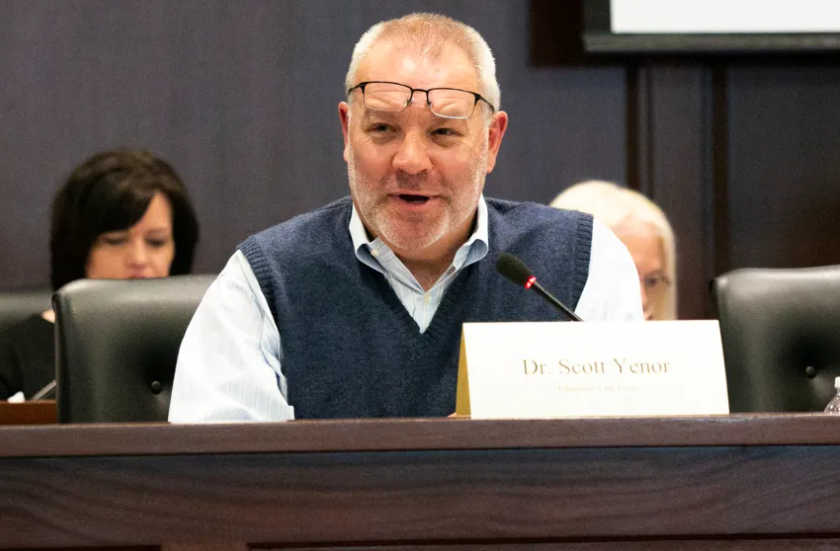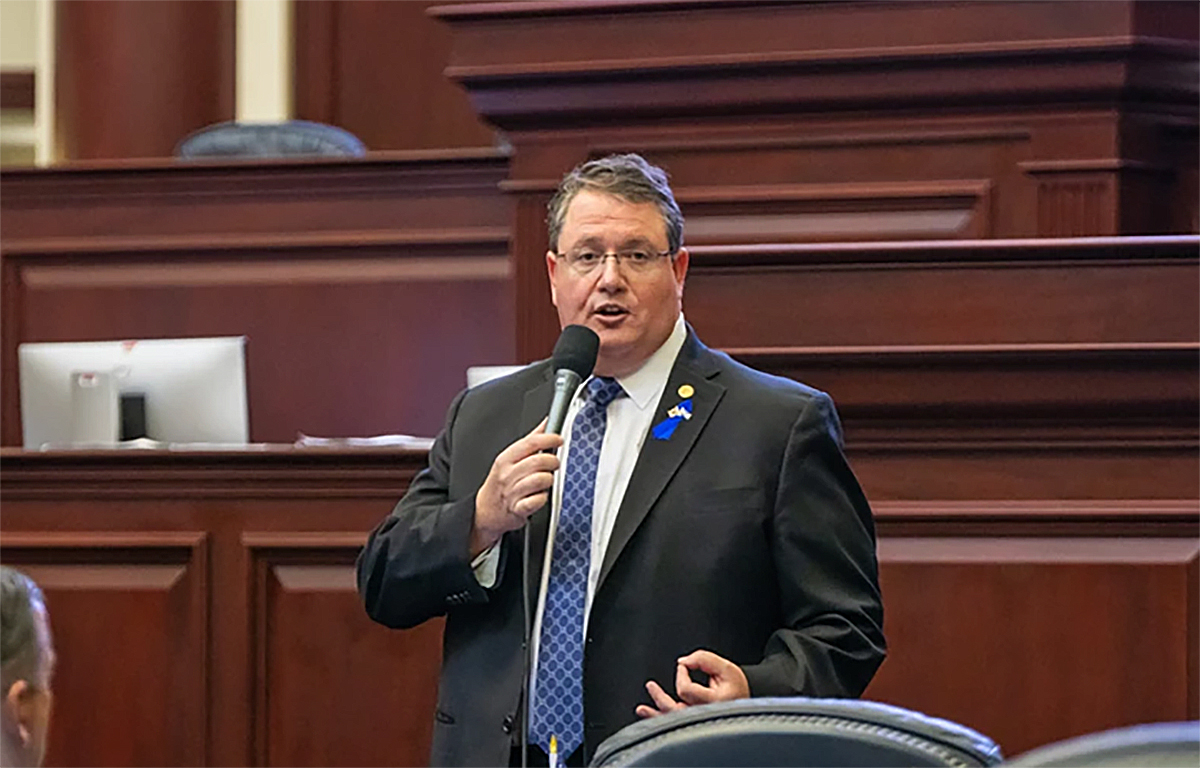After an hour of comments from residents who overwhelmingly opposed it, Republican Sen. Randy Fine’s latest attempt to ban Pride flags and other banners with a “political viewpoint” from public buildings advanced on a party-line vote.
The Senate Governmental Oversight and Accountability Committee voted 5-2 for the bill (SB 100), despite criticism from Democratic members Kristen Arrington and Tina Polsky that even after three years, the legislation is half-baked.
Fine admitted the measure could use some work and said he planned to tighten up its language, but argued its central premise is watertight.
“The idea here is that the government should not be in the political messaging business,” he said.
“Politics should be for the politicians. The government’s job is to serve the people.”
If passed, SB 100 or its House twin (HB 75) sponsored by Republican Reps. David Borrero and Berny Jacques would prohibit local or state government offices, schools and universities from displaying political or ideological viewpoints.
That includes flags, or depictions of flags, representing any “partisan, racial, sexual orientation and gender, or political ideology viewpoint.”
The ban would not extend to private individuals expressing private speech or viewpoints, including public officials who choose to do so on their own time. However, the measure also provides that active or retired military personnel may use “reasonable force” at any time to prevent the desecration, destruction or removal or unauthorized lowering of the United States flag.
Asked by Polsky whether that provision would enable a current or former military member to stop someone from burning a flag on their own property, Fine said yes.
“If you’re on your property burning the American flag, this bill would authorize them to exercise reasonable force to stop that behavior,” he said.
SB 100 does not define reasonable force. It also doesn’t define what is and isn’t a political viewpoint.
When he announced SB 100 in December, Fine said the bill takes aim at “fictional country flags like ‘Palestine,’ pro-violence ‘Black Lives Matter’ flags, woke and pro-grooming ideological flags, and the flags of any political candidate in government buildings.”
A passel of younger residents, many of them identifying as members of the LGBTQ community, spoke against the proposal by a more than 7-to-1 ratio. In total, 22 unelected attendees opposed the bill. Just three spoke voiced or signaled support for it.
Jon Harris Maurer, speaking for Equality Florida, said it was disappointing to be arguing again about a bill that failed twice before, chalking up its return more to “congressional posturing” — Fine is running for the U.S. House — than problem solving.
“This does nothing to help struggling Floridians,” he said, adding that simple things like an applicable definition for “flag” were still missing from the bill, as noted by Senate staff.
“These deficiencies have been glaringly apparent since last year and at this point, the only conclusion can be that the unconstitutional vagueness and ambiguity in this bill is intentional,” he said.
Mauer said the bill’s assumption that sexual orientation and gender identity are political viewpoints is beyond faulty. They’re “not political viewpoints,” he said. “They’re people’s identities — everyone, not just the LGBTQ community’s. Despite that fact, the bill’s sponsor has made it explicitly clear that his intent is to target Pride flags.”
Greg Mathers, a retired military vet speaking on behalf of Moms for Liberty, said it is the job of parents to instill their children with values and provide them ideological direction, while the government and schools should focus on streamlining education.
“It’s not the place in school rooms to have divisive symbols, things that are conversation starters for discussions that are best held between parents and children,” he said.
Arrington said SB 100 has several “scary” aspects and would all but invite future lawsuits, the cost of which would fall to taxpayers. It’s also inconsistent with Florida being about “freedom” while doing nothing to address many problems Sunshine State residents are dealing with, including unaffordability, a dearth of mass transit options and a need for more housing.
But lawmakers can walk and chew gum at the same time, Lake Mary Republican Sen. Jason Brodeur fired back. The Legislature sees some 3,000 bills and passes 10% of them yearly, he said, including legislation that has since reduced property insurance rates and attracted more providers to the state.
Brodeur noted that free speech isn’t absolute, citing court cases like Kennedy v. Bremerton that determined the First Amendment rights of public school teachers is not limitless and BWA v. Farmington, which found that students are subject to similar restrictions.
“These are places where there are exceptions to the all-public-employees-have-rights argument,” he said. “The government has no place in dictating what views are acceptable. Right — not mine, not yours. Government is a place for everybody.”
Fine said SB 100 isn’t yet in its final draft and that it could look very different if and when it reaches a Senate floor vote. He also cautioned those against the bill that there could soon be a circumstance where they wished its restrictions were in place.
“(For) the same people who are so upset that we might take away certain political flags in classrooms and oppose this bill,” he said, “I guarantee you if (Donald) Trump flags started showing up in classrooms and on government flag poles and in the back of this room, these people who are so upset about those flags being taken down would be in here screaming and yelling.”
SB 100 has two more committee stops before reaching a floor vote. It will next go before the Senate Community Affairs Committee.
HB 75, meanwhile, awaits a hearing in the first of three committees to which it was referred last month.
Post Views: 0


 Entertainment8 years ago
Entertainment8 years ago
 Entertainment8 years ago
Entertainment8 years ago
 Politics8 years ago
Politics8 years ago
 Tech8 years ago
Tech8 years ago
 Tech8 years ago
Tech8 years ago
 Tech8 years ago
Tech8 years ago
 Politics8 years ago
Politics8 years ago
 Tech8 years ago
Tech8 years ago











